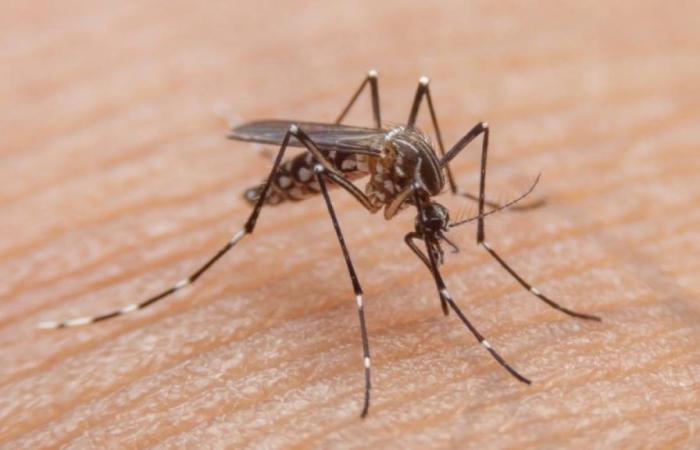According to registration figures from the Epidemiological Surveillance System (Sivigila) contributed by the Cundinamarca Health Secretariat (SSC) to EL TIEMPO, andThis year, 7,508 cases of dengue have already been reported in the department.
According to the criteria of
According to registration figures from the Epidemiological Surveillance System (Sivigila) contributed by the Cundinamarca Health Secretariat (SSC) to EL TIEMPO, andThis year, 7,508 cases of dengue have already been reported in the department.
According to Pan American Health Organization (PAHO), dengue is transmitted through the bite of an infected mosquito. It is a disease that affects people of all ages, with symptoms that vary from a mild fever to a disabling fever, accompanied by severe headache, pain behind the eyes, pain in muscles and joints, and erythema. The disease can progress to severe forms, mainly characterized by shock, respiratory distress and/or severe organ damage.
.
Photo:Dengue is worrying in Cundinamarca.
What is worrying is the massive departure of passengers this holiday season which, according to information from the Transport terminalis estimated at 1.9 million, many of whom go on vacation to the municipalities of the department.
What are the municipalities with the highest burden of the disease?
The records indicate that there are ten municipalities with the highest burden of the disease, adding a total of 5,283 cases. These are: Fusagasugá, with 1,649 cases; La Mesa, with 922; The College, with 478; La Vega, with 432; Cachipay, with 294; Villeta, with 332; Girardot, with 321; Anapoima, with 278; Viota, with 254; and Nilo, with 219.
Cundinamarca, health authorities explained, has maintained outbreak status so far this year, but has managed to control fatality. According to Cundinamarca Governorate, this department is no stranger to the behavior of dengue in the Americas and, especially, at the national level, being one of the territorial entities that, due to the El Niño phenomenon, has seen an unexpected increase. “The proportion of severe dengue is equivalent to 0.53 percent of the total cases reported until epidemiological week number 22 of 2024.”
Work has been done to raise awareness among health system actors involved in the care of patients with dengue.
According to the SDC, they have ensured the continuous and systematic monitoring of dengue and severe dengue cases, in accordance with the established processes for notification, collection and analysis of data. “This allows the generation of timely, valid and reliable information, essential to guide the prevention and control measures of this event.”
It is recommended to use repellent in hot or rainy areas.
Photo:iStock
They added that, from the clinical approach, it has been essential to support territorial entities in the implementation of the clinical approach to patients with dengue, ensuring comprehensive care in accordance with the clinical practice guideline for dengue and severe dengue. “In addition, work has been done to raise awareness among the different actors in the health system involved in the care of patients with dengue, through the epidemiological surveillance committees and the transfer of knowledge,” said spokespersons for the entity.
What do the experts say?
Two experts from the National University explained on Unimedios What could be generating this situation. The Master in Public Health Ángela Gómez, professor of the Nursing program at the National University of Colombia (UNAL), Orinoquia campus, points out that “it is crucial to eliminate mosquito breeding sites in homes and raise awareness in the community about preventive practices such as adding chlorine. in the accumulated water and install awnings to sleep in.”
For its part, the epidemiologist Fernando Pío de la Hoz Restrepo, professor at the UNAL Faculty of Medicine and former director of the National Institute of Health (INS), remembers that the transmission of dengue is directly related to social and environmental conditions. “The poor disposal of waste and the accumulation of water in open containers – in some cases due to the scarcity of the liquid – create ideal breeding grounds for transmitting mosquitoes, as well as urban disorder and lack of planning, which also contribute to this problematic.”
It is crucial to eliminate mosquito breeding sites in homes and raise awareness in the community about preventive practices such as adding chlorine to accumulated water and installing awnings for sleeping.
He explained that Climatic conditions such as temperatures that exceed 30 degrees Celsius with high humidity, and rainy seasons that generate stagnant places of clean water facilitate the reproduction of mosquitoes. “Dengue outbreaks can persist if sustained measures are not taken over time, both fumigation and vector control.”
UNAL experts point out that fumigation must be constant and accompanied by community work to destroy breeding sites, since it only exterminates adult mosquitoes, but does not affect the larvae, which is why it must be complemented with other control measures such as using fish that feed on the larvae, and undoubtedly constant education in homes.
Health sector workers tour critical areas to educate citizens.
Photo:Barranquilla Mayor’s Press
Gómez noted in Unimedios that “the authorities must identify the areas with the greatest transmission of dengue within the municipalities and focus control measures in these places; In addition, schools, transport terminals and other points of high congregation of people must be strictly monitored and controlled.”
The authorities must identify the areas with the greatest transmission of dengue within the municipalities and focus control measures in these places; In addition, schools, transport terminals and other points of high congregation of people
According to experts, dengue especially affects children and young people, since people over 25 years of age who live in these endemic regions have already developed some immunity to the virus, after having contracted its 4 serotypes: DENV-1, DENV-2, DENV-3 and DEN-V 4. “Pregnant women under 25 years of age are also vulnerable and should take additional precautions to avoid infection, as they can develop severe dengue and have complications in the development of the fetus.”
They added that, for now, the availability of vaccines is limited. “There are vaccines that are in development and some already authorized by the World Health Organization, but they are not yet widely available in Latin America. We hope that in one or two years we will be able to have a greater quantity of vaccines to control dengue.”
Finally, he warns that “it is very important not to confuse dengue with other diseases that present similar symptoms, which can be more deadly than dengue and require different treatment, which is why it is crucial that hospitals have the necessary resources to carry out differential diagnoses. ”.
CAROL MALAVER
DEPUTY EDITOR BOGOTÁ EDITOR
Write to us at [email protected]






